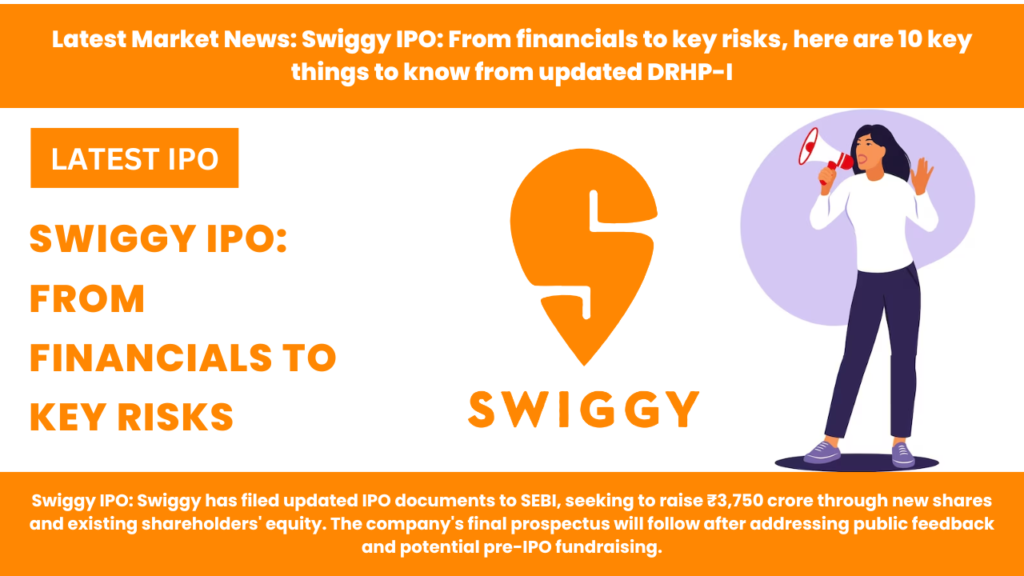Swiggy IPO: On Thursday, September 26, Swiggy, one of the leading food and grocery delivery company, submitted its revised draft documents to the Securities and Exchange Board of India (SEBI) to raise capital through its highly anticipated initial public offering (IPO). The proposed IPO includes a new issuance of equity shares valued at ₹3,750 crore and the sale of 18.52 crore existing shareholders’ equity shares through an offer-for-sale (OFS), as stated in the updated draft red herring prospectus-I (UDRHP-I). Additionally, the company is considering raising funds in a pre-IPO round, and if successful, the size of the new issuance will be adjusted accordingly.
Swiggy’s confidential offer document was accepted by SEBI earlier this week, and now the draft file has been amended. Using the confidential pre-filing process, the business submitted their offer document on April 30.
As per market experts, the firm must update the DRHP-II (UDRHP-II) after taking into account the modifications brought about by public feedback. Upon filing of the final prospectus, Swiggy can begin its initial public offering.
The IPO’s book-running lead managers (BRLM) include Kotak Mahindra Capital Company, Citigroup Global Markets India Private Ltd, Jefferies India Private Ltd, and Avendus Capital Private Ltd. Link Intime India Private Ltd serves as the registrar to the issue.
Here are 10 key things from the UDRHP-I that investors might want to know.
Swiggy IPO Selling Shareholders
The updated DRHP lists the following ten corporate selling shareholders: MIH India Food Holdings, Accel India IV (Mauritius), Apoletto Asia, Alpha Wave Ventures, LP, Coatue PE Asia XI LLC, DST EuroAsia V B.V., Elevation Capital V, Inspired Elite Investments, and Tencent Cloud Europe B.V. Samina Hamied, Sriharsha Majety, Rahul Jaimini, Lakshmi Nandan Reddy Obul, and P.R. Venketrama Raja are among the individual selling stockholders.
Swiggy IPO Peers
The company’s sole listed peer is Zomato (with a P/E of 742.50). In FY24, Swiggy generated ₹11,247.39 crore in revenue from its operations, whereas Zomato’s revenue stood at ₹12,114 crore. Swiggy reported a diluted EPS of ( ₹10.70), while Zomato’s EPS was ₹0.41. Swiggy’s NAV per share is ₹35.48, whereas Zomato’s NAV per share is ₹23.14.
Swiggy Business Details
With its user-friendly unified app, Swiggy is a cutting-edge, customer-focused technology company that gives users the ability to browse, choose, order, and pay for groceries and household goods (Instamart), as well as have their orders delivered right to their door via our network of on-demand delivery partners. The company’s platform may be used to schedule events (SteppinOut), order food delivery (Dineout), pick up and drop off products (Genie), and partake in other hyperlocal business ventures.
Swiggy Business Segments
The company is divided into five business segments, which include Food Delivery, Out-of-home Consumption encompassing dining out and events, Quick Commerce for on-demand delivery of grocery and household items, Supply Chain and Distribution for B2B supplies, warehousing, logistics, and distribution, and Platform Innovations for new initiatives and offerings like Swiggy Genie and Swiggy Minis.
Swiggy’s Strengths
The company excels in pioneering high-frequency hyperlocal commerce categories through an innovation-driven culture. They have a consistently expanding user network and increasing user engagement on their platform. The “Swiggy” brand is delivered through a unified app, ensuring a consistent user experience. They are the preferred choice for restaurant partners, merchant partners, brand partners, and delivery partners. The company’s platform has generated synergistic network effects due to its broad user and partner base. Additionally, they have an experienced professional management team and uphold high standards of governance.
Swiggy Industry
The Indian food services market is mostly unorganised, which limits the availability of food services, unlike in the USA. In the USA and China, the food services markets are about 1.2 times and approximately 0.6 times the size of the grocery markets, respectively. People in the USA and China are used to dining out, whereas the Indian food services market was only 0.1 times the size of the grocery market in 2023.
In India, the shift to organised food services is occurring simultaneously with hyperlocalisation. Therefore, there is still significant potential for growth and usage as organised supply catches up, especially with the emergence of cloud kitchens that focus solely on food delivery.
Swiggy Financials
With negative cash flows from operations, the firm has experienced net losses year since its formation. As of March 31, Swiggy’s losses for the fiscal year have dropped to ₹2,350.24 crore from ₹4,179.30 crore in FY23 and ₹3,628.89 crore in FY22. During the same time last year, operating revenue was ₹11,247.39 crore as opposed to ₹8,264.59 crore and ₹5,704.89 crore the year prior.
Swiggy IPO key risks
Some of the key risks are as follows;
- The company’s operations, financial situation, and business might suffer if it is unable to attract new consumers at a reasonable cost or maintain its current user base.
- Its company depends on attracting and keeping delivery partners, and its operations, finances, and business might suffer if they can’t do so in a way that is economical.
Swiggy Group Companies
The group of companies includes Loyal Hospitality Private Ltd, Loyal Hospitality Kitchens Private Ltd, MIH India Food Holdings B.V, and Vijayawada Hospitalities Private Ltd.
Lock-in of equity shares allotted to anchor investors
The anchor investor portion will have 50% of the equity shares allotted locked-in for 90 days from the date of allotment, while the remaining 50% will be locked in for 30 days from the date of allotment.
Disclaimer: The views and recommendations made above are those of individual analysts or broking companies, and not of 24onlive. We advise investors to check with certified experts before making any investment decisions.


